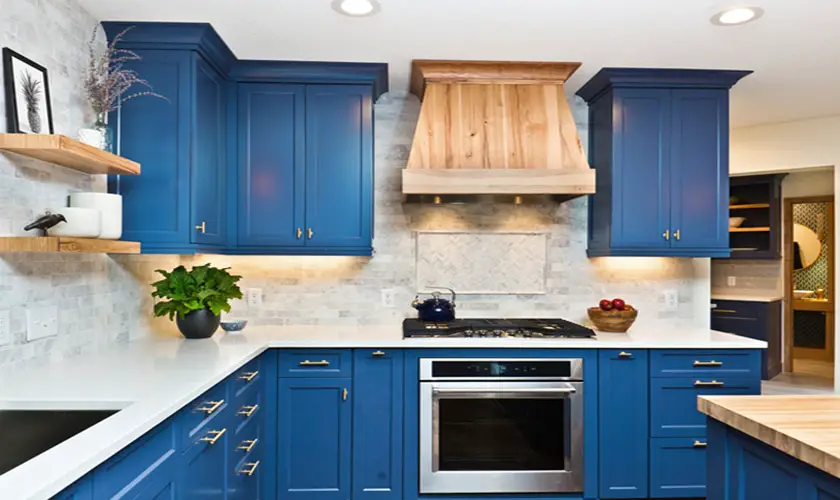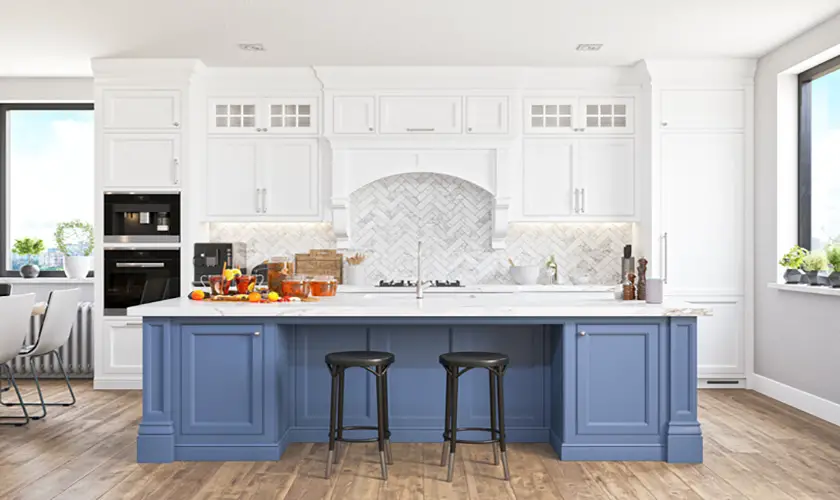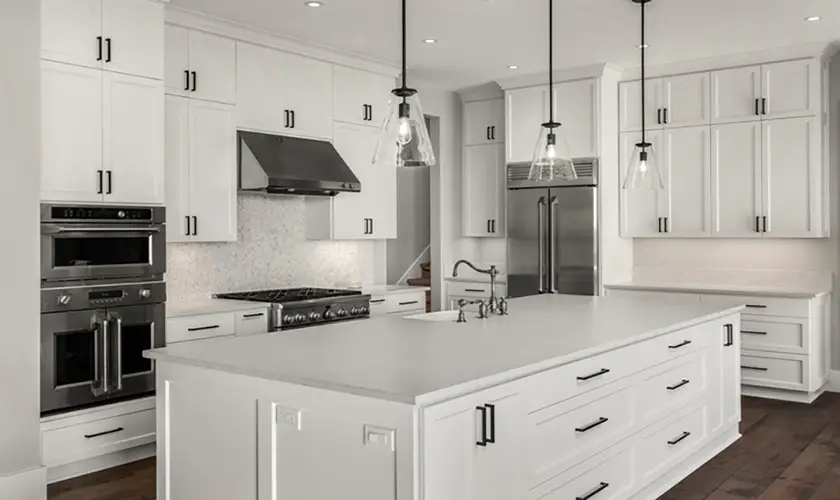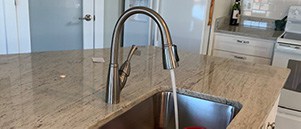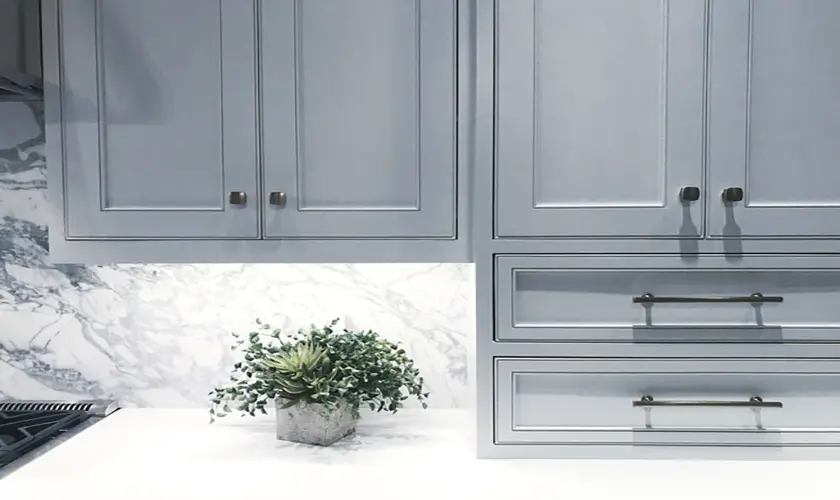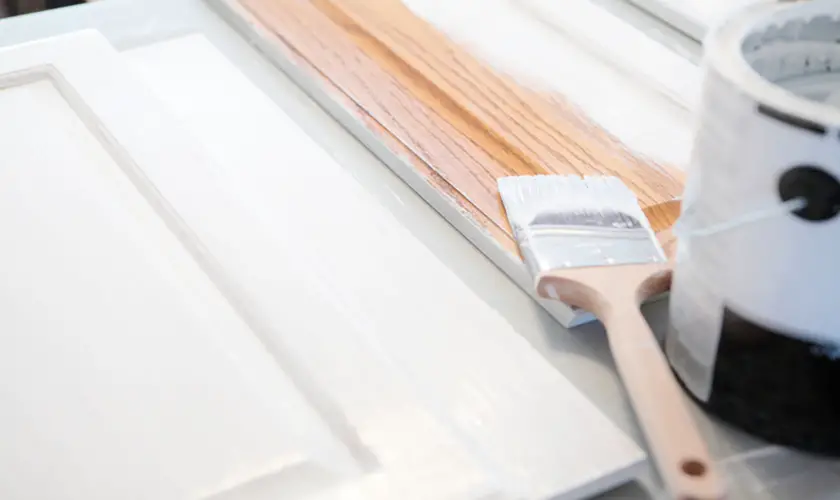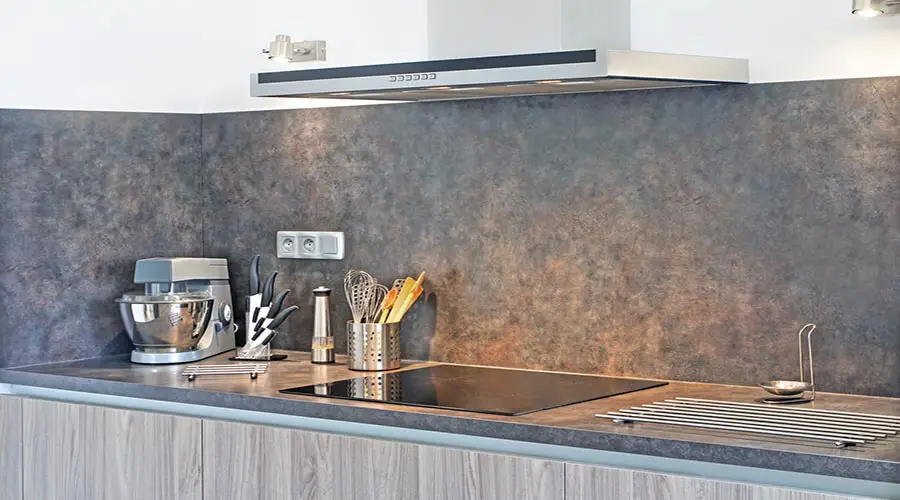
Range hoods are more common today than they have ever been. They make it possible to keep a clean kitchen while doing an abundance of cooking. Any time you use your stove or range, you release smoke, steam, grease, and other particles into the air.
While a range hood is a norm for kitchen ventilation and the best way to eliminate smoke and unpleasant cooking smells, not everyone has space or desires a range hood.
With advancements in kitchen technology, it’s easier to bypass the need for a range hood now than ever. You can get by without a range hood if you have an alternative means to keep your kitchen clean or simply not make as much of a mess when you cook.
In this article, we will explore how to do just that. We’ll look at range hood alternatives and creative ways to get around needing a range hood in your kitchen. Whether you don’t have the option to have a range hood in your kitchen or don’t want one, you’ve come to the right place.
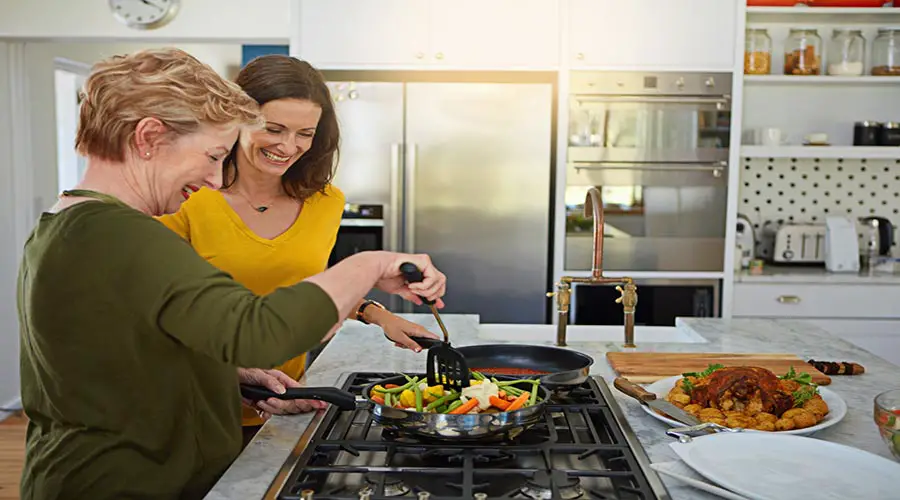
Reasons to Not Choose a Range Hood
While range hoods have become the new norm, they aren’t necessarily required for kitchens. Even if you have a range or do a ton of grill-top cooking, there are ways and reasons to circumnavigate the need for a range hood.
Save on the Cost
Range hoods are very costly to purchase and install in your home. A typical recirculating or vented range can cost between $300 and $1,500, plus the installation cost, which will take about 2 to 4 hours to install at $50 to $100 per hour for professional installation. You should expect to pay at least $700 to $1,000 for a new vented or unvented range hood.
Range Hoods can be Inefficient.
Vented range hoods, in particular, are highly inefficient for the heating and cooling of your home. Essentially, a vented range hood takes conditioned air inside your home, both the good and the bad, and vents it to the outside of your home. Venting air can result in higher heating and cooling bills during the summer and winter.
Kitchen Layout may Prohibit Easy Installation.
If you live in a smaller home with a cramped kitchen, you may not even have the option to install a range hood. The positioning of the stove could prohibit the installation of a kitchen hood. You can also have an issue where getting a power source to install a hood may prove difficult.
Avoid Maintenance & Upkeep Costs
Vented and unvented range hoods require regular maintenance to keep working their best. Recirculating range hoods have internal filters that must be cleaned and replaced regularly. Both range hoods have various internal components prone to breaking down and replacement.
Avoid Noisy Hood Fans
Range hoods are also quite noisy when they’re in operation. They have exhaust fans that whir and make a stew that disrupts an otherwise peaceful kitchen.
Top Range Hood Alternatives
Let’s dive into some of the top alternatives to get around using a range hood.
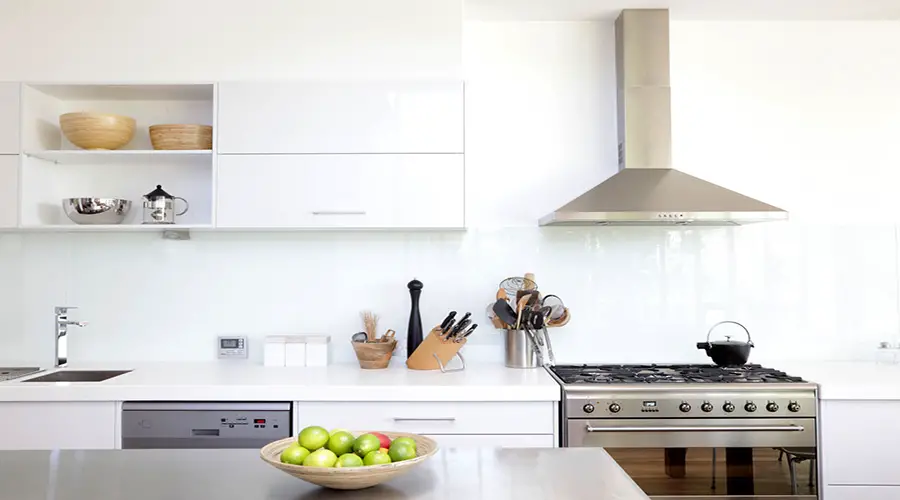
Open a Kitchen Window
Probably the easiest thing to do is open a kitchen window while cooking. While this is not an option in most parts of the world during cold weather, it is an option for almost everyone for a portion of the year.
Kitchen windows also present problems if painted shut or won’t stay open.
Portable Exhaust Fan
Portable exhaust fans are cheap, and low-maintenance, and you can move them wherever you need them. Portable exhaust fans work very similarly to vented and unvented range hoods.
The best way to use a fan is to set it up directly in front of a window, turn it on, and let it do its work. Like a vented range hood, your exhaust fan will suck air towards it and shoot it out the open window.
Air Purifier
Another great option similar to a recirculating range hood is an air purifier with a carbon filter. These air purifiers have internal fans and carbon-based filters that do what an unvented range hood does. It sucks air in, filters it through the carbon filters, and shoots it back out cleaner than it came in.
Air purifiers are great options for smaller kitchens, and they’re also portable so that you can move it from one cooking appliance to the other.
The Range Microwave Oven
The great thing about using an over-the-range microwave option is that everyone needs a microwave. These microwaves have recirculating fans and filters on the bottom that do the same thing an unvented range hood does. They suck air in, filter out the bad stuff, and release it back into your kitchen.
The downside of an over-the-range microwave oven is that not everyone has room for this. It’s likely that if you don’t have space for a range hood, you don’t have space for a giant microwave.
Charcoal Briquettes
Charcoal briquettes are precisely what they sound like – pieces of charcoal. For hundreds if not thousands of years, charcoal has been used as a fire starter and to manage foul odors.
Charcoal has an internal chemical makeup that soaks up odors and moisture from the air. Give it a try, and you will likely be shocked at how effective charcoal briquettes are at purifying your kitchen air.
Unfortunately, charcoal briquettes have their limitations. They don’t recirculate air or soak up grease, fat, and food particles.
They must also be replaced occasionally and shouldn’t be relied on solely to keep your kitchen clean. However, they’re a great, cheap, low-maintenance cleaner that complements fans, purifiers, or hoods.
Fan Plus Portable HEPA Filter
If you want to use the fan to purify your kitchen air but don’t want to blow it all outside, you can also use a HEPA filter.
Rather than placing your portable exhaust fan in front of a window and blowing air outside, you can set it up in front of a HEPA filter. The fan sucks air in and blows it through the filter, essentially turning this system into a recirculating range hood.
The air will come out of the filter clean pure, and circulate back into your kitchen.
Use a Grease Splatter Guard
Aside from purifying the air, range hoods also do an excellent job of soaking up grease and fat.
Alternative means of exhaust, such as fans, air purifiers, microwaves, and charcoal, are good at purifying the air, but they struggle to extract grease.
Therefore, using a grease splatter guard when you’re cooking is a good idea to protect your appliances.
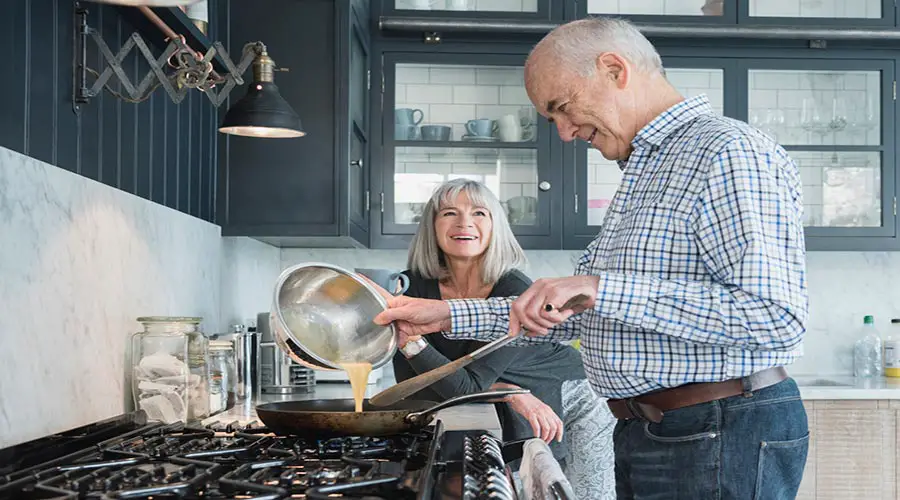
Pros of Range Hood Fans
- Overall, range hood fans better keep your kitchen cleaner and the air purer than alternative measures.
- Range hoods may save you money in kitchen repairs and cleanings.
- While somewhat difficult, it’s possible to install range hoods on your own and save money.
Cons of Range Hood Fans
- Range hood fans are louder and more expensive than alternative venting methods.
- Range hoods are bulky, difficult to install, and time to maintain.
- Range hoods are also more inefficient since they take conditioned air outside your home.
Ultimately, whether you choose to have a range hood or an alternative air circulation method in your home is up to you. If you try hard enough, you can almost always find a way around needing a range hood insert.
What Else Can I Do?
While each of the methods mentioned above is a good way to keep the air in your kitchen clean, they can’t do everything a range hood does. However, by implementing good practices in your kitchen, you can make up the difference and opt out of needing a range hood.
Clean and Maintain Your Kitchen
Regularly cleaning and scrubbing down your kitchen is extremely important, with or without a range hood. However, range hoods do an excellent job of soaking up grease, fat, and food particles from the air. Without one, you’ll have to stay extra vigilant in your kitchen and ensure it stays neat.
Specific places of interest should be your stovetop, kitchen cabinets, and countertops. Even though you can’t see them, tiny pieces of grease and fat float through the air when you cook and settle wherever they land. Before you know it, you’ll be able to see visual signs of grease and fat deposits.
Use Windows and Nearby or Portable Window Fan
If your kitchen is full of windows, the answer to your range hood problem might be as easy as opening them up. Open kitchen windows and doors on either side of your kitchen to create a natural flow of air that keeps it moving and removes smoke, steam, and other nasties.
Another good option is to turn on the exhaust fans in nearby bathrooms and laundry rooms. Turning bathroom fans on won’t be effective if they aren’t nearby, but it might be strong enough to help the air a little bit if your bathroom is adjacent to the kitchen.
Install a Nearby Wall Fan
You can opt to install an in-wall exhaust fan near the range. These fans will require placement near a wall plug for a power source.
Diffuse and Steam Aromatic Aromas
Diffusing or steam aromatic properties is another great idea to help with cooking odors. Charcoal briquettes are a great option, but not everyone likes having a pile of charcoal in the middle of their kitchen.
Other excellent options are essential oils with a diffuser or steamer and releasing delicious spices and herbs into the air. This goal isn’t necessarily to keep your kitchen clean but rather to help control cooking smells.
Find Alternative Cooking Methods
Whether you have a range hood or one of our alternative options, you’re still liable to make a mess while cooking with a stovetop, grill, or other messy ways.
If you’re serious about reducing the mess in your kitchen and keeping it as clean as possible, you might have to explore alternative cooking options. Don’t worry; college kids and bachelors have survived for centuries without ranges and cooktops. Here are some excellent ideas to start you off.
Crockpot
The crockpot is a lifesaver when it comes to cooking clean meals. You can cook almost anything in a crockpot, from meats and pasta to baked goods. Be advised, however, that crockpots take a while to work their magic, so be sure to plan ahead.
Instapot
Instapots are similar to crockpots but much quicker, hence the “insta” prefix. While Instapots save a ton of time in cooking, you should beware that they produce steam at the culmination of the cooking process.
You should open a nearby window to let the steam escape to keep your kitchen from getting humid or moldy.
Use Your Oven More
Using the internal oven on your range is much less messy than using your cooktop or grill. Smoke and grease created in the oven stay inside it rather than being released into the air. You only have to worry about smoke in an oven if you burn something, so be sure to hone your cooking skills.
Don’t Use Oil
Oil is one of the biggest contributors to smoke, grease, and fat released into your kitchen air. Reducing the amount of oil you use or using alternative types of oil is also healthy, and your colon will thank you.
Keep a Lid on It
If you’re boiling things or using pots and pans on a stovetop, keeping a lid on them will reduce smoke, grease, steam, and food particles in your kitchen. You will have to clean your kitchen less often, and your air will be cleaner if you keep a lid on your pots and pans during cooking.
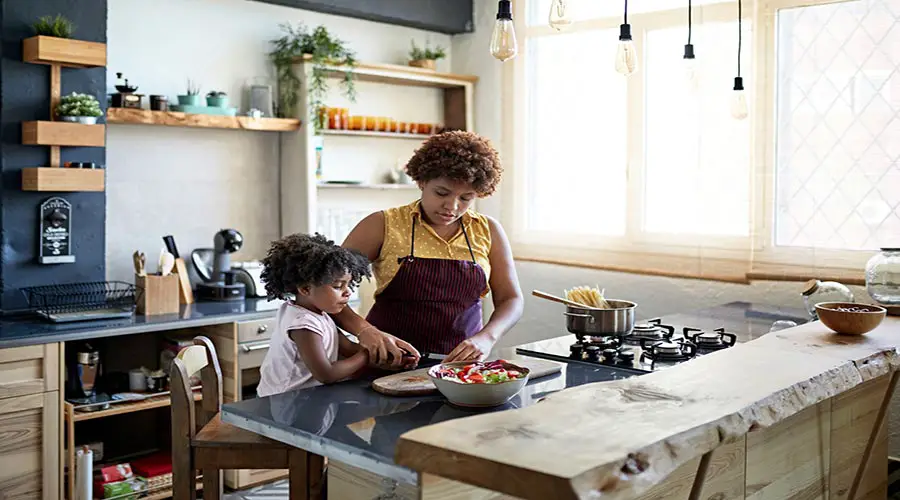
Are Range Hoods Really Necessary?
If you put enough planning and forethought into your alternative venting methods, you can bypass the need for a range hood. You should also keep your kitchen clean and use alternative cooking methods to reduce mess.
Is a Range Hood Better than an Exhaust Fan?
While you can circumnavigate the need for a range hood, it is still better than an exhaust fan. Exhaust fans aren’t as effective at pulling air into them and removing them from your kitchen as range hoods.
Can You Use a Gas Stove Without a Hood?
Using one of the methods mentioned in this article, you can use a gas stove without a range hood. However, it’s best to open a window or door to the outside if you’re using a gas stove. No amount of carbon filters or purifiers will capture all the gas released during cooking or baking.


